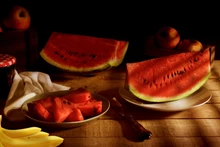
World Food Day is an international day which is observed every year on October 16th to commemorate the anniversary of the United Nations Food and Agriculture Organization's foundation in 1945.
Staying physically healthy might help you stay emotionally healthy as well. If you consume the right food and exercise regularly, your body will be strong and will help you manage with stress and fight disease. Eating healthily and exercising frequently as a teenager will also help you stay healthy later in life.
When you have diabetes, your dietary choices are extremely important. Some are superior than others. Nothing is entirely off-limits. Even foods that you would consider "the worst" could be occasional delights if consumed in small quantities. However, they will not assist you with your nutrition, and it is easier to control your diabetes if you stick to the "best" alternatives.
Starches
Carbohydrates are necessary for your body. But you also want to choose wisely. Then, Use this list as a guide.
Best Alternatives
• Whole grains such as brown rice, oatmeal, quinoa, millet, or amaranth
• Baked sweet potato
• Items prepared with whole grains and no (or very little) added sugar
Worst Option
• White rice and white flour are examples of processed grains.
• Cereals with few whole grains and a lot of sugar
• White bread
• French fries
• Fried white-flour tortillas
Vegetables
Fill up! You'll receive a lot of fibre and very little fat or sodium (unless you add them). Remember that potatoes and corn are carbohydrates
Best Alternatives
• Fresh vegetables, eaten raw or mildly steamed, roasted, or grilled
• Frozen veggies that have been mildly steamed
• Greens like kale, spinach, and arugula. Iceberg lettuce isn't as good because it's poor in nutrients.
• Canned veggies with low sodium or unsalted
• Choose a variety of hues, such as dark greens, red or orange (think carrots or red peppers), whites onions, and even purple eggplants. The 2015 U.S. Dietary Guidelines recommend 2.5 cups of vegetables per day.
Worst Choices
• Vegetables in cans with a lot of salt added
• Veggies that have a lot of butter, cheese, or sauce added to them
• If you need to limit your salt intake, pickles are a good option. Otherwise, pickles are OK.
• For the same reason as pickles, sauerkraut. If you have high blood pressure, you should limit your intake.
Fruits
They provide carbs, vitamins, minerals, and fibre. The majority of them are naturally low in fat and salt. However, they contain more carbohydrates than vegetables do.
Best Alternatives
• Fresh Fruits
• Frozen fruit or canned fruit with no added sugar
• Jams and preserves that are sugar-free or low in sugar
• Applesauce without added sugar
Worst Decisions
• Fruit canned with high-sugar syrup
• Fruit rolls that are chewy
• Jams, jellies, and preserves on a regular basis (unless you have a very small portion)
• Applesauce with added sugar
• Fruit punches, fruit drinks, and fruit juices
Protein
There are several options available, including beef, chicken, fish, pork, turkey, seafood, beans, cheese, eggs, nuts, and tofu.
Best Alternatives
According to the American Diabetes Association, the following are the best options:
• Proteins derived from plants, such as beans, nuts, seeds, or tofu
• Seafood and fish
• Poultry, including chicken (Choose the breast meat if possible.)
• Low-fat dairy and eggs
• If you consume meat, be sure it's low in fat. Remove the skin off the poultry.
• Even if you aren't a vegetarian or vegan, try to include some plant-based protein in the form of beans, nuts, or tofu. You'll receive minerals and fibre that animal products don't have.
Worst Decisions
• Fried meats
• Ribs and other high-fat portions of meat
• Bacon made from pork
• Regular cheeses
• Skinned poultry
• Deep- Fried Fish
• Deep-fried tofu
• Beans cooked with lard
Dairy
Maintain a low fat content. Keep your serving size small if you want to splurge.
Best Alternatives
• Milk, either 1% or skim
• Yogurt with low fat
• Cottage cheese (low-fat)
• Sour cream, low-fat or nonfat
Worst Decisions
• Whole milk
• Common Yogurt
• Regular Cottage cheese
• Sour cream (normal)
• Regular ice cream
Sweets, fats, and oils
They're difficult to resist. But it is easy to get too much and gain weight, making diabetes management more difficult.
Best Alternatives
• Nuts, seeds, and avocados are natural sources of vegetable fats (high in calories, so keep portions small)
• Omega-3 fatty acid-rich foods include salmon, tuna, and mackerel.
• Plant-based oils such as Canola, grapeseed, and olive oils
Worst Decisions
• Anything containing trans-fat. It's harmful for your heart. Check the ingredient list for anything labelled "partially hydrogenated," even if the label claims 0 grams of trans-fat.
• Large amount of saturated fats, which are mostly found in animal products but are also found in coconut oil and palm oil. Consult your doctor to determine your safe limit, especially if you have heart disease as well as diabetes.
Drinks
Drinks when you consume a favourite beverage, you may consume more calories, sugar, salt, or fat than you anticipated. Read the labels to find out what's in a serving.
Best Alternatives
• Flavoured or unflavored sparkling water
• Unsweetened tea, with or without a slice of lemon
• Light beer, small glasses of wine, or non-fruity mixed drinks are OK.
• Coffee, either black or with low-fat milk and sugar alternative
Worst Decisions
• Regular Sodas
• Beer, fruity mixed beverages, and dessert wines
• Tea with sugar
• Coffee with cream and sugar
• Coffees with flavours and chocolate beverage
• Energizing beverages











